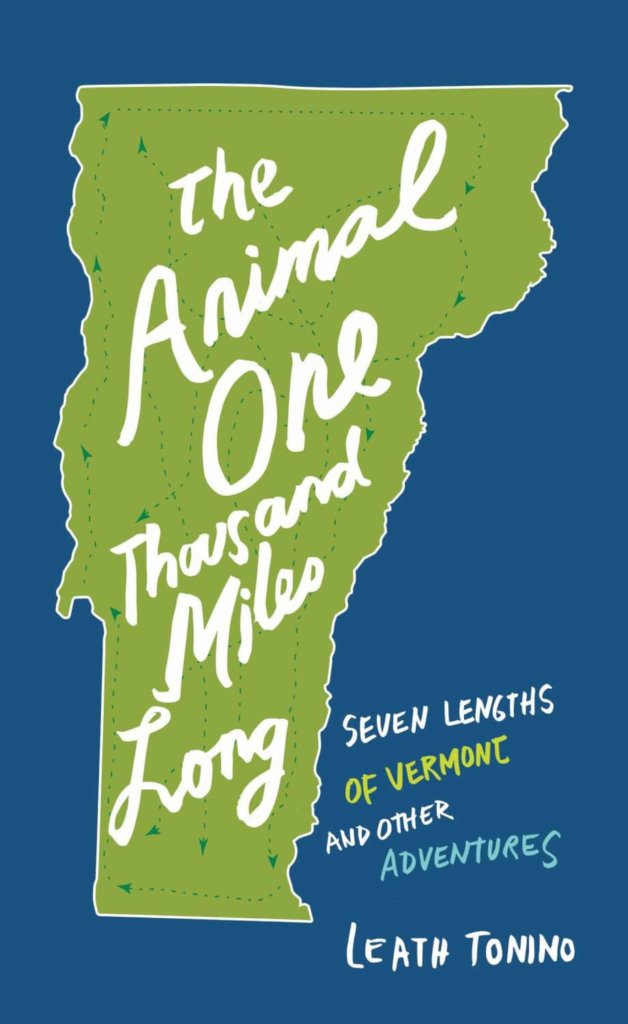Is there ice on the lake and snow on the trail?
 As I went walking that ribbon of highway
As I went walking that ribbon of highway
I saw above me the endless skyway
And saw below me that golden valley
This land was made for you and me
~ Woody Guthrie, This Land is Your Land
Charlotte-raised author Leath Tonino published a book this year through the Trinity University Press, San Antonio, Texas, titled The Animal One Thousand Miles Long: Seven Lengths of Vermont and Other Adventures.
The book is composed of a series of his essays that have appeared in various publications over the last seven years. In these essays he looks at nature through a description of the natural world’s basic elements, through descriptions of the interface between his own and the natural world’s biography and how the two mix in the places in which he finds himself at various times of his life. He precedes the book with a quote from beat poet and environmental activist Gary Snyder who says that “to know the spirit of a place is to realize that you are a part of a part and that the whole is made of parts . . .” Leath soon discovers that, in fact, Snyder has captured a truth about the areas of Vermont and the Champlain basin that he has ventured through looking for and discovering some of the novel nature of the area.
Tonino borrowed the poet-philosopher Aristotle’s way of describing a piece of land as “an animal a thousand miles long.” Leath feels he has done this, at least in his seven trips covering the length of Vermont by various means—hiking, hitching, biking, paddling, peddling, swimming and flying.
You’ll find a good deal of local flavor in his book. In an early chapter he titles “Bumping into Life,” he talks about sitting down with CVU teacher Chris O’Donnell in her classroom, the Vermont Atlas and Gazetteer on the table in front of them with Chris describing her desire to “do something outdoorsy” in each of Vermont’s 251 towns. Tonino picks up on her enthusiasm.
In a later chapter, “Frostbiting with Frostbiters,” Tonino gets together with Charlotte’s David Miskell, who, while known mostly for his organic greenhouse vegetable gardens, is also a kayaker who does an annual New Year’s Day paddle across Lake Champlain. Naturally, in his traversing of the region, Leath joins David and crew as they head west out of Kingsland Bay into the open lake with miles of whitecaps coming from the northwest, blown to crests by a “Miskell Wind.” Tonino says conversation stops at this point and he adopts a focus on the far shore that requires the discipline of an “almost-enlightenment monk.” (Such a statement lets the reader know that it’s not just the landscape. It is also the psychic flavor that landscape enhances.)
Whimsical reflections aside, Leath says he will “ponder the art of finding polar-style adventure in cozy, cute Vermont.”
Leath’s book is in many respects a lens on the land insofar as he tries to help the reader gain an appreciation for what nature and humanity share. He was hooked on this interaction at an early age, primarily through his family, friends, education—all these factors helped create his inquisitiveness. In the book he helps us gain an understanding of what the interaction means to him and how he tests his own knowledge. Leath’s self consciousness about what he sees around him makes this book an interesting delving into the nature of nature.
The final chapter—and the one that gave it its title—takes Leath by seven different means of transportation, from back-packed hiking to airplane, up and down the length of Vermont, from Quebec to Massachusetts and back via seven different routes. His goal, he says, is that by the end of the year and a “few thousand miles back and forth through human and more-than- human communities,” he’d be able to “draw together in consciousness all those disparate lengths, seeing them—feeling them, if only for an instant—as grand parts of a unified whole.”
Having myself traveled around not only this region, but also others throughout this country and the world, I think I can appreciate his curiosity, even though the reason for my travel was not always of my own doing.
Let’s start here in Vermont, however. Since it is our whole as well as his that he describes, I encourage readers of this piece to pick up Leath’s book and see how well it meets your expectations and your own experiences.
Related Stories
Popular Stories
If you enjoy The Charlotte News, please consider making a donation. Your gift will help us produce more stories like this. The majority of our budget comes from charitable contributions. Your gift helps sustain The Charlotte News, keeping it a free service for everyone in town. Thank you.
Andrew Zehner, Board Chair







